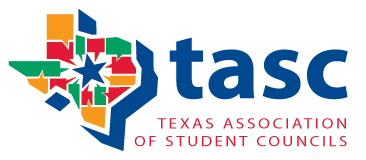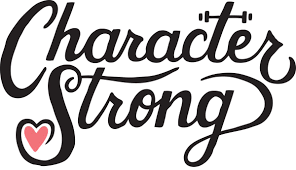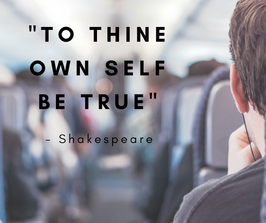 “To Thine Own Self Be True.” In the Leadership class I teach at school we are currently working our way through the classic “7 Habits of Highly Effective Teens” by Sean Covey, the son of Stephen Covey. (As an aside, having read both Sean’s teen-focused volume and Stephen’s original “7 Habits of Highly Effective People”, I prefer the teen version with its focus on personal growth and relationships. The adult version also talks about such things, but does so with more of an eye to productivity and the bottom-line which has always been of less interest to me than personal growth and building community. Maybe I prefer the teen version because while I am an adult, I have spent 32 years of my life in high school - but I digress). One of the first key concepts explained in both books is that of the “Personal Bank Account.” The notion behind the Personal Bank Account is that we each have a bank account or balance sheet with ourselves. And like a real-life bank account we make both deposits and withdrawals, with the account balance reflecting which of those are done more frequently. Examples of deposits include keeping promises to yourself (wake up at 6 am, mow the lawn before it rains, write a new blog entry, study for an upcoming test, etc.), forgiving yourself, taking time to refresh or renew yourself, or using your talents. Withdrawals would be the opposite; breaking promises, beating yourself up, burning out, being who others want you to be. A positive balance in the Personal Bank Account builds confidence, allows momentum to be established for future endeavours, and provides a wellspring from which to give to others. A negative balance then shakes confidence, establishes a pattern of falling short, and in turn can lead to isolation or despair. There is much talk today about concepts like anxiety, resilience, and grit. Experts proclaim that today’s teens experience high levels of anxiety and low levels of resilience and grit. They talk about what can be done systemically to address these concerns, whether it be how we parent, coach minor sports, how we teach, how employers deal with teens, and so on. Perhaps one answer lies in something as simple as being aware of one’s own personal bank account and taking the necessary steps to make those valuable deposits. Set simple landmarks for each day and experience the boost that comes from keeping this word to yourself. Use this momentum to tackle larger tasks. Forgive yourself if you break such a promise and start again. When feeling overwhelmed, press pause and do something for yourself (read a book, take a walk, or my favourite - take a nap). Use what you’re good at and enjoy for something bigger than yourself; don’t be button-holed into doing certain things or acting a certain way based on the expectations of others. Shakespeare’s original line “To Thine Own Self Be True” is spoken by Polonius in Act I Scene III of Hamlet as advice to his son who is setting off to Paris. Polonius was not privy to the concept of the Personal Bank Account and in the context of Shakespeare’s time the words can also be taken to mean “put your own interests or benefit first.” Our modern take on the quotation is more in line with Covey’s exhortations. Keep promises to yourself, take care of yourself, be yourself, and express yourself. Whether a teen struggling with anxiety and overwhelmed by expectations (both external and internal) or an adult languishing in an unfulfilling career or relationship, Polonius’ advice and Covey’s concept can be a lifesaver. Before every airplane flight passengers are informed that should the cabin lose pressure the oxygen masks will fall in front of you. They are then admonished to put on their own mask before assisting others. This isn’t selfish - it is logical. You won’t be able to help anyone with their mask if you are not getting oxygen yourself. “To Thine Own Self Be True.” Make a promise to yourself and keep it. Repeat. If you take one step back, forgive yourself, regroup, renew, and take two steps forward. Build momentum surely and slowly for bigger objectives. Build up a positive balance in your personal bank account and use it as a springboard to explore what matters to you and how to bring that out to the world. Don’t be afraid to put your own interests to the forefront for your own well-being. You will feel the difference, and over time those around you will feel it too.
2 Comments
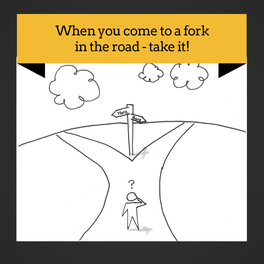 At first glance this famous Yogi Berra quotation does not seem to offer much practical advice. However confusing it may seem, it can serve to point us in the right direction. On a recent school field trip to Chicago we were reminded before crossing the border to turn off our data or face potentially large bills from our cell phone carrier. Later other people found their phone displaying the wrong time as it had not made the time zone switch at the Illinois border. However, I was not concerned with either situation as the defaults on my phone were already set to turn data off while roaming and to automatically adjust to new time zones. You may wonder what these cell phone stories have to do with the challenges of decision-making? They illustrate a powerful tool that I call “advance decision making”. When crossing the border or crossing into a new time zone there was no further action needed to be taken on my part because my phone’s settings had already dealt with the situation. In a similar way we can make decisions in advance, set our personal defaults if you will, to ease the difficulty of some of life’s short-term and long-term decisions. I have found “advance decision making” to be very helpful in many different situations. Setting your defaults in place helps prevent relying on changing circumstances or shifting feelings to make decisions for you. You will not have to take further action, just deal with the situation according to your default settings. And like the default settings on your phone you can always make changes to them as your needs change. I wrote previously about Getting Off the Goal Carousel and the importance of scheduling in those items that would get you to your objectives, rather than gearing up for a specific goal, achieving it, then falling back into the same bad routines and having to set the same goal all over again. Advance decision making is the key to breaking this cycle. In order to get into better shape as a lifestyle I have now joined some friends in a twice weekly fitness class. I have decided in advance that Tuesday and Thursday at 6:45 pm I head to the gym. No more waiting until after school each day to decide whether or not I feel like working out. I don’t set my alarm in the morning and decide if I feel like going to the pool or going back to bed. At this point I don’t have a specific “goal” like an upcoming triathlon, however I have the objective of improving my overall fitness and a scheduled routine in place to do that. I feel already that I will likely want to add one more fitness related event into my schedule and when I decide what that is I will add it into my weekly default settings as well. I have been eating better and doing so more consistently this year as well. I have decided in advance what foods I will eat more of, what foods I will eat less of, and what foods I have eliminated entirely. And I know what days I will break from this routine. No more opening the fridge or the cupboard and deciding what to eat, or how much of it to eat, based on what is there. I don’t wait and see what my body is craving and feed it whatever it feels like at the time. The decisions on what to eat have been made in advance. In my high school and university years deciding in advance that I was not going to use and abuse alcohol or drugs meant that I could safely move in and out of any social circle and any social situation and not be pressured into doing something that I would later regret. My default settings were locked in and I simply had to follow them. I had many peers who would try to make these decisions in the heat of the moment and later wish they had chosen differently. And of course there were others whose defaults were different than mine and that was their choice too. In our marriage my wife and I believe strongly in the sanctity of our marriage vows. We have decided in advance that whatever decisions we make we will make them together, with each other, for each other, and that going our separate ways is not an option. After 22 years we don’t wait to see how we feel each day to decide if we will honour that commitment. The feelings that motivated us to commit to each other originally might not be the same feelings we have every day after that, especially as life throws changing circumstances, children, careers, tragedies and triumphs our way. But we have decided in advance that we were going to love our choice everyday. Does advance decision have other applications? It sure does. Have children who you want to help with their education in the future? Don’t wait to see what might be left over after your vacation, golf membership, and new car are paid for - decide in advance to put away $200 a month as soon as you can and sit back and watch their college fund grow. In school and want to do better? Find it hard to motivate yourself to sit down and study with so many distractions? Don’t wait to see if the course interests you or when the assignments are due. Decide in advance to do 30 minutes of work every day on the course you are worried about, decide what 30 minutes it will be, sit down, put your phone away, do the work and watch your grades improve. Have someone in your home you butt heads with all the time? Don’t wait to see how they are treating you or if they have stopped doing what bugs you. Decide in advance that for the next 2 weeks you are going to say only positive things to them and watch the relationship improve. Is your toddler or teen driving you crazy? Are you finding that your response to their misbehaviour varies with your mood or energy level? Take the emotion out of your reactions by deciding, and making it clear, in advance what the consequences of their actions and choices and will be. Then follow through on your advance decisions. Repeat this pattern. Both you and your child will see the benefits. Adults often need help with our gadget settings from younger people who more instinctive with their devices as they are experienced in dealing with them every day and from an early age. Similarly adults can help young people with their life default settings as we have experience with situations they will face having been through them before. I used to think that some people were just naturally a certain way; whether that be naturally happy or sad, positive or negative. But I have to come to believe that these settings can also be influenced like the defaults on our phone. Perhaps not instantly; but certainly over time. Decide in advance to see the bright side of situations or not to always point out how someone could have done something differently. Research shows that over time you will find your overall outlook begin to change. Maybe you want to change the trajectory of your life around how you treat people and being more grateful. Decide in advance to be intentional in thanking people more often. Yogi Berra may not have been very helpful with the directions to his house when he uttered the now famous phrase, “When you come to a fork in the road - take it.” But his instructions serve to illustrate the importance of being decisive and knowing in advance what you plan do when faced with a decision. When you come to a fork in the road, follow what your defaults are set to and you will avoid unnecessary detours and costly delays on your road to a better place. 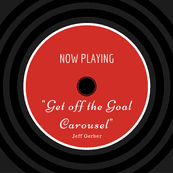 My mission at this momentous time of year should be to write a stirring tribute to goals, to outline the merits of setting and achieving goals, and to provide some quick easy-to-digest tips on how to set and meet your goals for the upcoming weeks, months, and year. Instead I must admit I have a problem with goals. My experience has been that setting and achieving goals can be easy; but real change is hard. So sharing a stirring tribute to goals and offering practical encouragement for setting and achieving goals would be disingenuous. Let’s go deeper shall we? In the last year or so I have set and achieved a number of what we would categorize as classic SMART goals in the area of physical fitness and diet/nutrition. In the spring of this year I set a goal of completing a local triathlon (known as the “Tinman”) consisting of a 400 metre swim, followed by a 15 km bike, and finishing up with a 5 km run. I knew the distances. I knew the date of the event. I had an idea of how much advance preparation I would need to do to complete the race. I also had the added incentive of trying to finish ahead of my 3 high-school aged kids who were also registered for the event. My goal was Specific, Measurable, Attainable, Results-Oriented and Time Bound. And I am happy to say I put in the necessary training, completed the race, and did so in a time that was several minutes ahead of my kids! Goal set and achieved. A solid win-win. Just this fall I set a goal of losing some pounds that had become a steady and unwanted companion. I had a target weight in mind. I knew the time I wanted to lose it by. I had an eating plan to get me there. And I knew what pants I wanted to fit into. Textbook SMART goal. And by early December I had lost the weight I wanted to and had myself some more pants to wear. Goal set and achieved. Another solid win-win. So what is the problem? The problem is that I had set, and achieved, all of these goals before. Multiple times. I had completed the Tinman Triathlon in 2007, 2009, and 2011. I had shed those same unwanted pounds using a variety of different methods more times than I care to count. I was stuck on what I call the “Goal Carousel”. Setting and achieving these goals was relatively easy. What was hard was making the underlying changes in my life so that being fit and eating right were part of my daily life instead of goals that had to be set and achieved - repeatedly. I have observed this same phenomenon in the classroom. Students learn SMART goals. Some may even go beyond SMART goals and learn how to set and achieve HARD goals (Heartfelt, Animated, Required, Difficult). Students will use these lessons and determine what they need to do on the next assignments and tests to get a desired mark on a course. And some will do just that. Then after the rush of setting and achieving the goal has worn off they find their grades settling back to where they were before. So they set new goals for the next report cycle, just as I did for the next triathlon or the next round of eating better, and the Goal Carousel continues. Renowned improvement expert James Clear addresses this in his article (http://jamesclear.com/goals-systems) where he encourages people to look past goals to systems. He found that his experiences were similar to mine: that goals, even those that we set and achieve, can actually be counterproductive to the long-term structural changes that we are after and that will get us the true results we desire. Setting up a training plan and achieving a goal of completing a triathlon, following a plan to shed some weight, or drawing up a homework schedule to get better marks are all well and good. When we do it we feel that we have accomplished something; and we have. Yet this sense of accomplishment can short circuit our desire to dig deeper, beneath the goal, to the fundamental lifestyle changes we are really after. We let up because we reached our goal. But if we haven’t changed our habits we will be back on the “Goal Carousel”: set goal, meet goal, relapse, set goal, meet goal, relapse, repeat. So how do we get off the Goal Carousel? It takes long-term commitment to sustainable lifestyle changes. I have been on the Goal Carousel of fitness and nutrition instead of making physical activity and eating sensibly part of my enduring everyday routine. Changing our everyday routines in the service of incremental change is hard. Telling someone I am at the pool swimming lengths for the upcoming triathlon with my kids is an interesting narrative. Going to the pool twice a week, every week, month after month, to be in better shape for the long haul is far more meaningful, but somehow less motivational. Cramming for an upcoming test is easy - most students do that. You can tweet about it and be in the same boat as your classmates. Doing review and extra work when the test is weeks away is hard. But it is the latter routine that will pay off. Having the house clean to host family is a great goal. Tidying up every day is harder but more effective. Saving up for a family vacation is a great goal. Saving every week, week after week, to pay off a mortgage that comes due in 17 years or for a child’s college college education that is 10 years away is hard. But that is the point. The Goal Carousel can be a fun ride. But the real change you seek will only come through advance decision-making and changing your habits and routines over the long-term. Instead of waiting for an upcoming race, running out of pants that fit, or some other momentous occasion, decide today what the long-term objectives are that you want to pursue. They can be career moves, financial objectives, fitness or nutrition decisions, or maybe you need to prioritize a person or relationship in your life. Decide in advance what you have to do to achieve your objectives. Understand the necessary changes that will affect your lifestyle and schedule them in. Write them down. Put them in your phone. And stick to the decisions you have already made. For over a decade in our house we never missed a kids’ hockey game or practice. Sounds crazy to see it in print but it is true. Why? We decided in advance they were important commitments and scheduled other things around them. Treat your long-term objectives with the same respect. Make tucking in your kids, visiting the nursing home, cooking with real ingredients, your weekly savings deposit, time at the gym, or time for your key client your priorities. Schedule them in and stick to your schedule. For the long haul. You may miss the thrill of the Goal Carousel but the the momentum of keeping promises to yourself will keep you going. And the incredible benefits over time will be worth it. |
Thoughts from JeffCheck back for the latest from Jeff..... Archives
October 2017
Categories |
Upcoming and Recent Engagements |
Assorted Past Engagements
|
|
British Columbia Student Leadership Conference - Oct 25/26, 2024
Abbotsford, BC Westwood Dental Group - Sept 12, 2024 Guelph, ON Lester B Pearson HS - Aug 26, 2024 Montreal, QC Vale Elementary School - Aug 14, 2024 Vale, OR* Carbon County School District - Aug 8, 2024 Rawlins, WY* Rotary Club - May 29, 2024 Kitchener, ON Avon Maitland DSB ETFO PD - May 21, 2024 Seaforth, ON SDSS (Leadership Workshop) - May 15, 2024 Stratford, ON Stratford District Secondary School - May 6, 2024 Stratford, ON HOBY Western Ontario Seminar - May 3, 2024 Ridgetown, ON Waterloo Collegiate Institute - May 1, 2024 Waterloo, ON English Montreal School Board Leadership Camp - April 25, 2024 Montreal, QC Derby School District - April 19/22, 2024 Derby, KS* SouthWest Student Leadership Conference - April 9, 2024 London, ON Stratford District Secondary School (Staff) - April 8, 2024 Stratford, ON West Oak PS (Staff) - April 8, 2024 Oakville, ON Lions Club District Convention - April 6, 2024 Stratford, ON Three Rivers Homelink - March 27, 2024 Richland, WA* Horizons Leadership Tour - March 10-15, 2024 La Crete, Fort McMurray, Calgary, Olds Alberta California Association of Directors of Activities (CADA) - Mar 8, 2024 Reno, NV Horizons Leadership Tour - Feb 21-23, 2024 Camrose, Edmonton, Morinville AB Missoula County Schools - Feb 12, 2024 Missoula, MT* Texas Association of Student Councils Advanced - Feb 9-11, 2024 Mo-Ranch Assembly, Hunt TX The Village School - Feb 7, 2024 Houston, TX WESCO Interhigh Student Leadership Conference - Feb 6, 2024 Lynnwood HS, Bothell, WA Texas Association of Student Councils Advanced - Jan 27-29, 2024 Lakeview Conference Centre, Palestine TX Alliance for Progress School - Jan 26, 2024 Lafayette Hill, PA* Columbia Basin Hospital - Jan 17, 2024 Ephrata, WA Northern Hills School - Jan 2, 2024 San Antonio, TX* NA4SA National Conference on Student Activities - Dec 1-3, 2023 San Francisco, CA McKinnon Park Secondary School - Nov 30, 2023 Caledonia, ON Central Secondary School - Nov. 17, 2023 London, ON Ontario Student Leadership Conference - Nov 5-7, 2023 Niagara Falls, ON Nova Scotia Teachers Union - Oct 27, 2023 Halifax, NS John Caldwell School - Oct 26, 2023 Grand Falls, NB Blackville School - Oct 25, 2023 Blackville, NB Canadian Student Leadership Conference - Oct 11-14, 2023 Saint John, NB Woodstown HS - Oct 10, 2023 Woodstown, NJ* AB Lucas Secondary School - Sept. 28, 2023 London, ON West Shamokin Jr/Sr High - Sept 15, 2023 Rural Valley, PA Armstrong Jr/Sr High - Sept 14, 2023 Kittanning, PA |
Mount Boucherie SS - Sept 12, 2023
Kelowna, BC Greene County & Fort Madison Schools - Aug 16,17 2023 Jefferson & Fort Madison, IA* Geneseo Central School District - June 21, 2023 Geneseo, NY* Channelview ISD - June 6, 2023 Channelview, TX* Chaffey High School District - May 30, 2023 San Bernardino County, CA* Southern Alberta Interscholastic Leaders Conference - May 9,10 Lethbridge, AB Regional High School - May 4, 2023 Digby, NS Lockview HS - May 3, 2023 Fall River, NS Three Oaks High School - May 2, 2023 Summerside, PEI Global Student Leadership Summit - May 1, 2023 London, ON Waterloo Collegiate Institute - April 27, 2023 Waterloo, ON Swope Middle School - April 14, 2023 Reno, NV Horizons Leadership Tour - April 2-4, 2023 Edmonton, Lloydminster, Vermillion AB Clayton Heights Secondary School - Mar 8, 2023 Surrey, BC Fleetwood Secondary School - Mar 7, 2023 Surrey, BC Rutland Senior Secondary School - Mar 6, 2023 Kelowna, BC California Association of Directors of Activities (CADA) - Mar 3, 2023 San Diego, CA Western University Education Conference - Feb 22, 2023 London, ON Cameron Heights Collegiate Institute - Feb 9, 2023 Kitchener, ON Bridgeport School - Nov 16, 2022 Kitchener, ON Ontario Student Leadership Conference - Nov 6-8, 2022 Niagara Falls, ON Hole in the Wall Gang Camp Staff Training - Nov 2, 2022 Virtual Talk Stonewall Collegiate- Oct 14, 2022 Stonewall, MB Beaver Brae Secondary School - Oct 12, 2022 Kenora, ON AB Lucas Secondary School - Sep 21, 2022 London, ON Campbell County School District - Aug 15, 2022 Gillette, WY* Shasta County Office of Education - Aug 12, 2022 Redding, CA* KIPP St Louis - Aug 3, 2022 St. Louis, MO* Oak Ridge Schools - Jul 20, 2022 Oak Ridge, TN* Arkansas City Public Schools - Jul 18, 2022 Arkansas City, KS* Horizons Leadership Conference - May 24, 2022 Lockview HS, Fall River NS MacLean Memorial School - May 2, 2022 Chibougamau, QC Horizons Leadership Conference - Mar 8, 2022 Virtual Western University Education Conference - Feb. 22-25, 2022 London, ON (Virtual) Avon Maitland DSB Remote Learning School - Jan 25, 2022 Canadian Student Leadership Conference - Oct 21-23, 2021 Virtual Campus Global Student Leadership Days - May 18-19, 2021 Everywhere! Brant County Rec Staff Training, Dec. 21, 2020 Global Student Leadership Days -May 6-7, 2020 Brock University ConEd, St Catherines ON - Mar 7, 2020 Camp Wabanaki Leadership Staff Training - Jun 23, 2019 City of Kitchener Neighbourhood Camps Staff - Jun 9, 2019 *CharacterStrong Staff Professional Development |
 RSS Feed
RSS Feed




